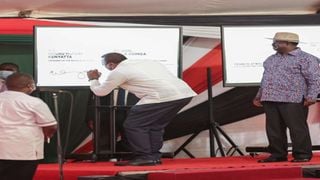Breaking: Autopsy reveals how Cyrus Jirongo died

President Uhuru Kenyatta and ODM leader Raila Odinga lead Kenyans in signing the BBI form during the National launch of the BBI signatures collection exercise at KICC in Nairobi County.
| PSCUPolitics
Premium
Motive behind key amendments to BBI report
What you need to know:
- The draft Bill must secure the support of at least 24 county assemblies to progress to Parliament.
- The revised Bill proposes retention of Majority and Minority Leader posts in the Senate
The revised Building Bridges Initiative document reflects a tight balancing act by the drafters who extended equal sweeteners to key groups in a bid to avoid upsetting rival constituencies.
Having proposed appointment of Members of Parliament to the Cabinet in the first draft, the revised version extended similar privileges to Members of County Assemblies who can also be appointed to county cabinets.
The Constitutional of Kenya (Amendment) Bill, 2020, proposes that the MPs’ Constituency Development Fund be anchored in the constitution, just as well for the MCAs’ Ward Development Fund.
Another amendment seeks to remove a provision in the constitution that disqualified an MCA from being elected as an MP, which saw Gatundu North MP Wanjiku Kibe lose her seat in an election petition in which her challenger said she had not resigned her position as MCA in 2017 when she was nominated to vie for the constituency seat.
“The existing disqualifications for the Members of the County Assemblies from being qualified to be elected as Members of Parliament are removed,” reads the Bill.
These goodies to the lawmakers apparently is because they are crucial to the success of the referendum.
The draft Bill must secure the support of at least 24 county assemblies to progress to Parliament.
If the Bill passes, a county government will be allowed to prepare its budget based on its own sources of revenue, without reference to the Division of Revenue Bill, a win for governors.
Senate's oversight role
But to check this financial autonomy, Senators’ oversight scope has been expanded beyond the national revenue allocated to county governments to cover all county revenues and their expenditures.
“The existing provision only mandates the Senate with oversight role on the national revenue allocated to the county governments and does not expressly extend such mandate to counties’ own source of revenue and borrowings and their expenditures. This is expected to enhance accountability of counties in matters of public finance and enhance service delivery to the people,” reads the Bill.
For Senators, who felt slighted as members of the National Assembly secure more plum positions, including Premiership and cabinet appointments, the revised Bill proposes retention of Majority and Minority Leader posts in the Senate which had been dropped in the first draft.
To further appease Senators, they will approve key presidential nominees, including the Judiciary Ombudsman, Controller of Budget and commissioners of the Youth Commission.
And to balance political interests in the National Assembly, the revised Bill proposes that a Prime Minister and the Leader of Official Opposition should not come from the same party.
The Leader of Official Opposition shall be the person who received the second greatest number of votes in a presidential election and whose political party or coalition of parties has at least 25 percent of all the members of the National Assembly.
The Prime Minister will be an elected member of the National Assembly who is the leader in the National Assembly of the largest party or coalition of parties.
According to the proposals, the Prime Minister shall be the leader of government business in the National Assembly and shall supervise the execution of the functions of ministries and government departments.
To woo women, the Bill compels political parties to ensure that not more than two-thirds of their candidates are of the same gender and lists sanctions for violation of the provision.
“This is to compel political parties to facilitate the actualisation of the gender rule in the electoral process from the nomination stage,” reads the Bill.
Another amendment seeks to mandate the Independent Electoral and Boundaries Commission (IEBC) to ensure that all lists of candidates forwarded to it for consideration of nomination by political parties comply with the two-thirds gender principle.
The revised Bill spares IEBC officials from a ruthless purge, as the electoral team will come in handy in the speedy implementation of a new proposal for creation of an extra 70 constituencies.
“Within six months from the commencement date of this Act, the IEBC shall determine the boundaries of the additional 70 constituencies,” the Bill stipulates, partly explaining why the Wafula Chebukati-led team was spared.
IEBC's jurisdiction
IEBC has however lost the jurisdiction of handling disputes arising from the nomination of candidates by political parties, which has now been transferred to the Political Parties’ Disputes Tribunal.
“The amendment removes the jurisdiction of handling disputes arising from the nominations of candidates by political parties from IEBC and vest it in the Political Parties’ Disputes Tribunal so as to achieve speedy adjudication of such disputes and streamline the mandate of the Commission,” reads the Bill.
The lifespan of Equalisation Fund given to 14 counties to bridge the development gap has also been increased from the current 20 years to 30 years.
The move by the team is seen as an extension of an olive branch to pastoralists’ counties that had earlier vowed to reject the report.
Article 204 of the Constitution establishes the Equalisation Fund in Kenya into which should be paid 0.5 percent of all the revenue collected by the national government each year.
This amount is calculated on the basis of the most recent audited accounts of revenue received, as approved by the National Assembly.
A clause on economy and shared prosperity requiring the State “to promote sustainable sources of livelihood including agriculture” has been expanded in the revised Bill to cover “pastoralism and the blue economy.”





